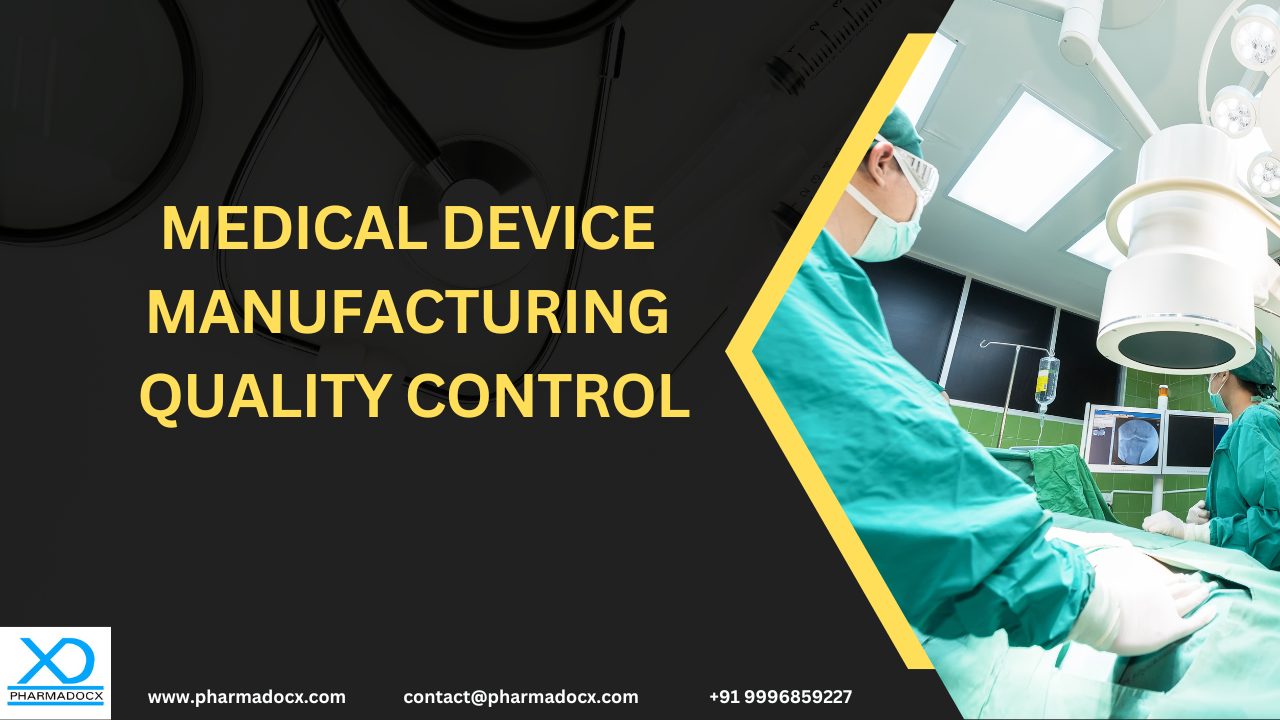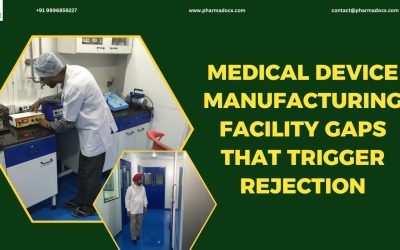The health and safety of individuals depend on the proper functioning of the medical devices. Medical devices are aimed at improving the lives of their users. However, any malfunction of these devices can pose as a serious health threat for individuals and can be life threatening. For example, a spinal surgery tool with a chemical leak may induce paralysis. An insulin pump releasing incorrect levels of insulin can lead to a diabetic shock. Hence, the need for a thorough quality control system for medical devices. The quality control step is essential for any industry. This step is pivotal in ensuring the finished product is devoid of defects and meets the industry requirements. Similar to quality control for any product, medical devices quality control is of high importance. In this blog, we will focus on quality control in medical device manufacturing and its importance.
Quality control in medical devices
Medical devices quality control ensures compliance with manufacturing and regulatory process. A systematic approach is used to maintain the highest efficacy, safety, and reliability standards. The quality control step ensures the manufactured devices will perform as intended. They will provide accurate and reliable result and are safe for diagnosing, monitoring, and treating patients. Whether the quality standards and regulations have been met are verified in the quality control step. The primary steps include material inspection, manufacturing process control, and rigorous testing. Medical devices quality control ensures effective patient care, thereby helping to maintain a positive industry reputation for the manufacturer.
Quality control of medical devices includes a set of procedures and processes that is aimed to identify and prevent defects in the finished products. Additionally, aimed at ensuring the devices meet regulatory requirements. The quality control process focusses on the design of the device, manufacturing process, and testing and distribution of the final product.
Importance of medical devices quality control
Medical devices play a vital role in patient diagnosis, treatment, and care. Effectiveness of healthcare treatments and patient safety are dependent on the quality of the medical devices. Hence, rigorous quality control measures are required. This step is a crucial requirement to market medical devices.
Why should you focus on the quality control of medical devices?
- To promote patient safety and improve quality of life the patients
- To verify whether stringent regulatory and industry standards have been met
- To ensure traceability, accountability, calibration, and compliance with regulations, such as ISO 13485 and FDA requirements
- To prevent defects and device malfunctioning
- To prevent extensive loss caused by product recalls
- To build trust with regulatory authorities and healthcare professionals
Quality control in medical devices manufacturing confirms that they are devoid of defects and consistently meet precise specifications. Product recalls and the need for redesign are unnecessary trouble that can be avoided with thorough quality controls. Additionally, these unnecessary hassles can lead to a drain in financial resources. Instead of wasting time and resources on product recalls and redesign, which could have been avoided with a stringent quality control step, the funds can be used for innovation. Failure to comply with regulatory standards can have legal repercussions. Defects in the products can lead to liability risks and legal claims. Moreover, this can tarnish the reputation of the manufacturing company. By ensuring effective medical device quality control, the manufacturer can ensure the well-being of the patients, regulatory compliance, minimize liability, and preserve its reputation in the healthcare industry.
Quality control vs quality assurance in medical device manufacturing
Quality control and quality assurance are both part of the quality management system. However, both these steps have different and vital roles to play in the medical device manufacturing industry.
- Quality control: The main focus of this step is the finished product rather than the process. The quality control inspector for medical devices ensures the product is ready for distribution and sale.
- Quality assurance: This step focuses on the manufacturing process rather than the final product. This step aims to mitigate flaws in the process used to manufacture the medical device. Any issues in the manufacturing process that can lead to defects in the products and noncompliance with the regulation are identified. The quality assurance step is spread across the medical device manufacturing process and not focused on any particular part of the process.
Hence, quality control for medical devices is a reactive process and looks for issues afterwards. Quality assurance is a proactive process carried out throughout the manufacturing process to prevent problems. Both these components are crucial to ensure that the manufactured medical devices are up to the required standards.
Medical devices quality control process
The mandatory quality control process verifies whether the safety and efficacy requirements have been adhered to. The quality process is usually well documented to warrant the proper compliance of the medical devices with the essential standards. This guarantees safety and efficacy in healthcare applications.
The medical devices quality control process includes the following steps:
- Design control: This step aims to confirm the device is designed correctly and will serve its intended purpose. The design control step involves design validation and verification.
- Quality planning: This step includes setting proper quality control metrics, criteria, and performance expectations for medical devices. The quality standards and objectives are defined in this step.
- Material and component inspection: Raw materials and components are inspected to identify any non-compliance and the issues are addressed. The aim of this step is to ensure the starting components meet the specified quality standards.
- Manufacturing process control: This phase ensures the steps of the manufacturing process adhere to the quality benchmark. The established procedures and standards are to be maintained consistently throughout the manufacturing process. Parameters, such as pressure, temperature, and cleanliness, are validated in this phase.
- Product testing: Post production, to verify functionality, safety, and performance, each batch of medical device undergoes various confirmatory tests. The tests include stress testing, functional testing, and specific tests associated with the device’s intended use.
- Documentation: Comprehensive and detailed records need to be maintained throughout the quality control process. Design and production details, testing records, and any deviations or non-conformances are documented.
- Maintenance and calibration: A vital step for quality compliance is regular maintenance and calibration of the manufacturing equipment and instruments. This ensures accuracy and consistency.
- Traceability: A unique identifier is assigned to each medical device to trace and track the device. This helps track the device’s design history and determine areas of improvement for quality.
- Risk management: This step aims to identify design and manufacturing process flaws. This vital step can mitigate potential risks that may hamper the proper functioning of the medical device.
- Post-marketing surveillance: Once the product is out for sale and distribution, the quality control team focuses on post-market surveillance. This step monitors the performance and safety of the device being sold and addresses any quality issues.
- Regulatory compliance: Ensuring compliance with relevant regulations and industry standards is the most important component of the quality control process.
Quality control: A vital step in medical device manufacturing
The primary goal of a medical device is to improve the quality of life of patients. However, if the device malfunctions due to the lack of quality control, it can lead to determinantal consequences. A thorough medical devices quality control step will help reduce chances of product failures and recalls. By implementing proper quality control measures, manufacturers can ensure compliance of the medical device with regulatory standards while meeting user requirements. Obtaining medical devices manufacturing license is another crucial step in medical devices manufacturing. Pharmadocx Consultants is here to make the painstaking medical devices licensing process easy for you. Call/Whatsapp us at 9996859227 or drop an email at [email protected] and let us help you with all your medical devices licensing needs.





